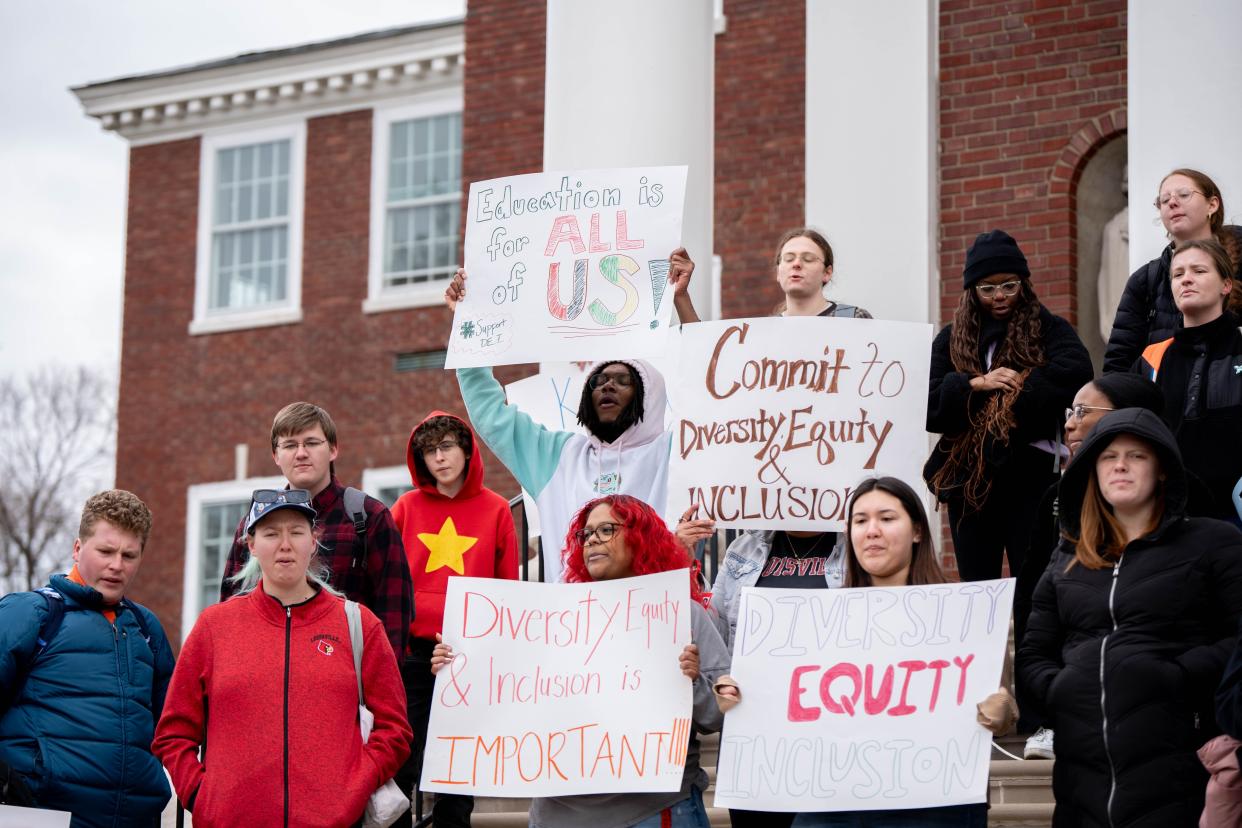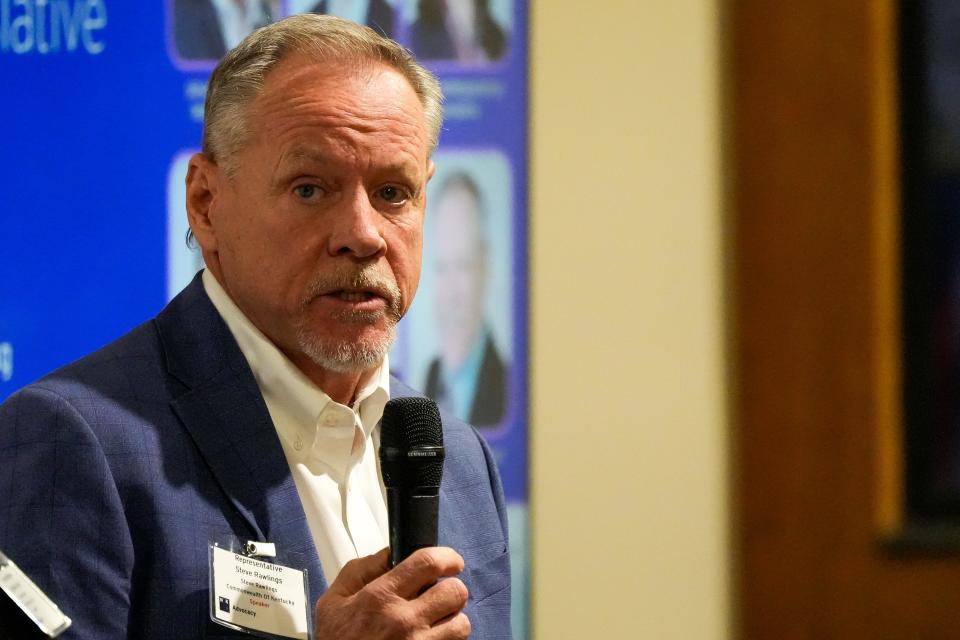NKY lawmakers: Ban campus DEI programs which make colleges extreme, anti-Christian

- Oops!Something went wrong.Please try again later.
- Oops!Something went wrong.Please try again later.
Extreme, anti-Christian, liberal. That's how two Northern Kentucky lawmakers describe college campuses – and they blame diversity, equity, and inclusion programs. They're not alone.
Since 2023, legislators throughout the country have proposed 82 bills against DEI, as it's called for short, in 28 states, according to The Chronicle of Higher Education. 13 have been signed into law.
Two bills that would essentially eliminate DEI in higher education were introduced this legislative session: House Bill 9 and Senate Bill 6. The House approved the latter, adding parts of HB 9 to it.
The Senate, however, failed to pass the bill before the 10-day veto period, making the bill almost certainly dead. But DEI remains a divisive issue in the culture wars.
The paradox of legislation banning DEI is that graduating students are stepping into a workforce where DEI is embraced and used as a tool to attract and keep workers, business leaders say.
Without DEI, Northern Kentucky business leaders say they're worried students and workers, already in short supply, could avoid the Bluegrass State altogether.
What is DEI?
In short, diversity, equity, and inclusion programs help different marginalized groups have "representation, participation, and a sense of belonging," USA Today reported.
It's been around since at least the Civil Rights era, but it was thrust into the national conversation in 2020 after George Floyd, a Black man, was killed by Minneapolis police officer Derek Chauvin, a white man.
The racial reckoning that followed Floyd's murder prompted businesses, universities, and schools to commit to DEI efforts through training and other programming.
For about the same amount of time, DEI has gotten pushback from conservatives and Republicans.
Steve Rawlings, R-Burlington, told The Enquirer, "It's absolutely a mindset that people have bought into and it's become the most important thing to them. My issue would be you can't practice your faith with that in place – you're not permitted to or you'll be expelled from the environment or won't feel comfortable or it's problematic to be there in that environment."

Inclusivity is 'good for business'
The Northern Kentucky Chamber of Commerce's mission is all things business – how to grow one, keep employees, and attract new businesses to the area.
But there's a looming worker shortage in the area's future.
Considering the state already has a worker shortage – about 74 people for every 100 jobs, according to the U.S. Chamber of Commerce – it seems likely there won't be enough Kentucky-born workers to fill that gap.
Brent Cooper, president and CEO of the Northern Kentucky Chamber of Commerce, said that means it's essential to keep workers in Northern Kentucky and bring new people into the fold.
"Those are facts. They can't be argued. The business community knows it. And that is why everything we're talking about is about growing, attracting and retaining talent – because we're facing this demographic cliff in front of us," he said.
Creating a welcoming and diverse business community is a big part of doing that.
"As we continue to grow and bring people here, we need to embrace diversity of thought, we need to embrace different perspectives and opinions," he said. "And there's a lot of data that backs up that when you do that, it makes your business more productive."
A 2022 national survey of 1,000 full-time workers said 40% of the surveyed employees would leave their place of employment to work at a more inclusive company.
Cooper said a survey of the chamber's members showed that most businesses said creating a diverse business community should be a priority for the organization. It offers DEI training and programming throughout the year.
The Northern Kentucky Chamber hasn't taken an official position on HB 9 or SB 6. But it is one of only four chambers in the state with a full-time lobbyist who works in Frankfort during the legislative session.
There, the chamber pushes for what its members want, like better childcare options, increased mental health services, and ways to grow the workforce through any means possible.
"That's the message we're delivering over and over again, and our universities are a key part of growing, attracting and retaining talent. There's no question about it," he said.
Why ban diversity, equity, and inclusion?
State Rep. Steve Doan, R-Erlanger, said House Bill 9 would have banned DEI in higher education, "So that we get back to the fundamentals of educating our future workforce, as opposed to pushing more social concerns onto them."
And while the bill stalled this session, lawmakers added parts of it to Senate Bill 6.
That includes a ban on race-based scholarships and DEI offices and officer positions.
Doan said getting rid of DEI is also about money. For instance, the University of Kentucky has spent millions on DEI – staff, training, programming, according to its budget.
Getting rid of DEI he said, could help funnel that money elsewhere and lower tuition to make things more affordable.
At Northern Kentucky University, dozens of jobs have been slashed over the years. Meanwhile, it continues offering DEI services.
NKU released a statement about the bill in January: "We will approach any legislative changes with our mission in mind ensuring our students, faculty and staff know we value all viewpoints and perspectives."
An NKU spokesperson did not grant two requests for interviews about DEI.
Doan's support for getting rid of DEI is also rooted in his own experience at NKU.
For instance, he said he took college courses focused on race and gender politics and didn't feel like he could express his opinions in that class, specifically after Hurricane Katrina in 2005 and the death of civil rights leader Coretta Scott King in 2006.
"Coretta Scott King is lying in state. This is a very incredible and powerful woman. You've just had George W. Bush accused of being racist for failing to properly address Hurricane Katrina. And I tried to start the conversation as what does this mean in a broader context? ... It was shut down completely – and always shut down by students who just didn't want to have those conversations," he said.
As for DEI being good for business, Doan said he talks to business leaders frequently and DEI does not come up in most of those conversations.
Rawlings said he thinks DEI inflames tensions between people, which is one of the primary reasons he wants it banned in universities and colleges.
"The result is divisiveness, people being offended, people focusing on skin color. And it's not what we used to do," he said.
"I went to college in the 70s. Even then, I didn't know of any experiences of racism back then at that time. … (if) there was racism, it was quietly handled, and people didn't go out publicly about it," he said.
Rawlings, who is white, said his perspective is anecdotal and he might be "the wrong person to ask about that because I didn't sense any bad stories."
What's next?
Right now, the session is in a veto period. That means the legislative process is on pause while Democrat Gov. Andy Beshear decided whether to sign bills into law, veto them, or allow them to become law without his signature.
The final version of SB 6 was not passed in time to make it to Beshear's desk, though, lawmakers can still pass the bill in the final two days of session in mid-April. But they won't be able to override a likely veto from the governor if they pass it then.
More: Kentucky's 'anti-DEI' bill appears dead after GOP lawmakers miss veto deadline
Beshear spoke in favor of DEI during Black History Month, the Courier Journal reported. Equity, he said, is "something we should all want in our heart," while inclusion is "what we teach each and every one of our kids, how we're supposed to approach this world as one people — one Team Kentucky."
But DEI is far from dead among lawmakers nationwide.
At the beginning of the year, there were eight anti-DEI laws in effect throughout the country. In the past few weeks, five more have passed in the Republican-dominated states Wyoming, Utah, Indiana, Idaho and Alabama, The Chronicle of Higher Education reported.
Last year, Kentucky Republicans had 75 of 100 seats in the General Assembly. Now, they have 80, the Courier Journal reported. While 2023 is an election year, it's not likely Democrats will flip enough seats to have a supermajority next year.
That means the issue of DEI is ripe to be on the table again for lawmakers who would already have a written bill to work with next session.
This article originally appeared on Cincinnati Enquirer: Why NKY lawmakers want to ban DEI?

